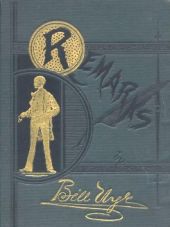Remarks
by Bill Nye

I am glad to notice that in the East there is a growing disfavor in the public mind for selecting a practicing physician for the office of coroner. This matter should have attracted attention years ago. Now it gratifies me to notice a finer feeling on the part of the people, and an awakening of those sensibilities which go to make life more highly prized and far more enjoyable.
I had the misfortune at one time to be under the medical charge of a coroner who had graduated from a Chicago morgue and practiced medicine along with his inquest business with the most fiendish delight. I do not know which he enjoyed best, holding the inquest or practicing on his patient and getting the victim ready for the quest.
One day he wrote out a prescription and left it for me to have filled. I was surprised to find that he had made a mistake and left a rough draft of the verdict in my own case and a list of jurors which he had made in memorandum, so as to be ready for the worst. I was alarmed, for I did not know that I was in so dangerous a condition. He had the advantage of me, for he knew just what he was giving me, and how long human life could be sustained under his treatment. I did not.
That is why I say that the profession of medicine should not be allowed to conflict with the solemn duties of the coroner. They are constantly clashing and infringing upon each other’s territory. This coroner had a kind of tread-softly-bow-the-head way of getting around the room that made my flesh creep. He had a way, too, when I was asleep, of glancing hurriedly through the pockets of my pantaloons as they hung over a chair, probably to see what evidence he could find that might aid the jury in arriving at a verdict. Once I woke up and found him examining a draft that he had found in my pocket. I asked him what he was doing with my funds, and he said that he thought he detected a draft in the room and he had just found out where it came from.
After that I hoped that death would come to my relief as speedily as possible. I felt that death would be a happy release from the cold touch of the amateur coroner and pro tem physician. I could look forward with pleasure, and even joy, to the moment when my physician would come for the last time in his professional capacity and go to work on me officially. Then the county would be obliged to pay him, and the undertaker could take charge of the fragments left by the inquest.
The duties of the physician are with the living, those of the coroner with the dead. No effort, therefore, should be made to unite them. It is in violation of all the finer feelings of humanity. When the physician decides that his tendencies point mostly toward immortality and the names of his patients are nearly all found on the moss-covered stones of the cemetery, he may abandon the profession with safety and take hold of politics. Then, should his tastes lead him to the inquest, let him gravitate toward the office of coroner; but the two should not be united.
No man ought to follow his fellow down the mysterious river that defines the boundary between the known and the unknown, and charge him professionally till his soul has fled, and then charge a per diem to the county for prying into his internal economy and holding an inquest over the debris of mortality. I therefore hail this movement with joy and wish to encourage it in every way. It points toward a degree of enlightenment which will be in strong contrast with the darker and more ignorant epochs of time, when the practice of medicine was united with the profession of the barber, the well-digger, the farrier, the veterinarian or the coroner.
Why, this physician plenipotentiary and coroner extraordinary that I have referred to, didn’t know when he got a call whether to take his morphine syringe or his venire for a jury. He very frequently went to see a patient with a lung tester under one arm and the revised statutes under the other. People never knew when they saw him going to a neighbor’s house, whether the case had yielded to the coroner’s treatment or not. No one ever knew just when over-taxed nature would yield to the statutes in such case made and provided.
When the jury was impanelled, however, we always knew that the medical treatment had been successfully fatal.
Once he charged the county with an inquest he felt sure of, but in the night the patient got delirious, eluded his nurse, the physician and coroner, and fled to the foot-hills, where he was taken care of and finally recovered.
The experiences of some of the patients who escaped from this man read more like fiction than fact. One man revived during the inquest, knocked the foreman of the jury through the window, kicked the coroner in the stomach, fed him a bottle of violet ink, and, with a shriek of laughter, fled. He is now traveling under an assumed name with a mammoth circus, feeding his bald head to the African lion twice a day at $9 a week and found.
 Continue...
Continue...![[Buy at Amazon]](http://images.amazon.com/images/P/B000875S1G.01.MZZZZZZZ.jpg)